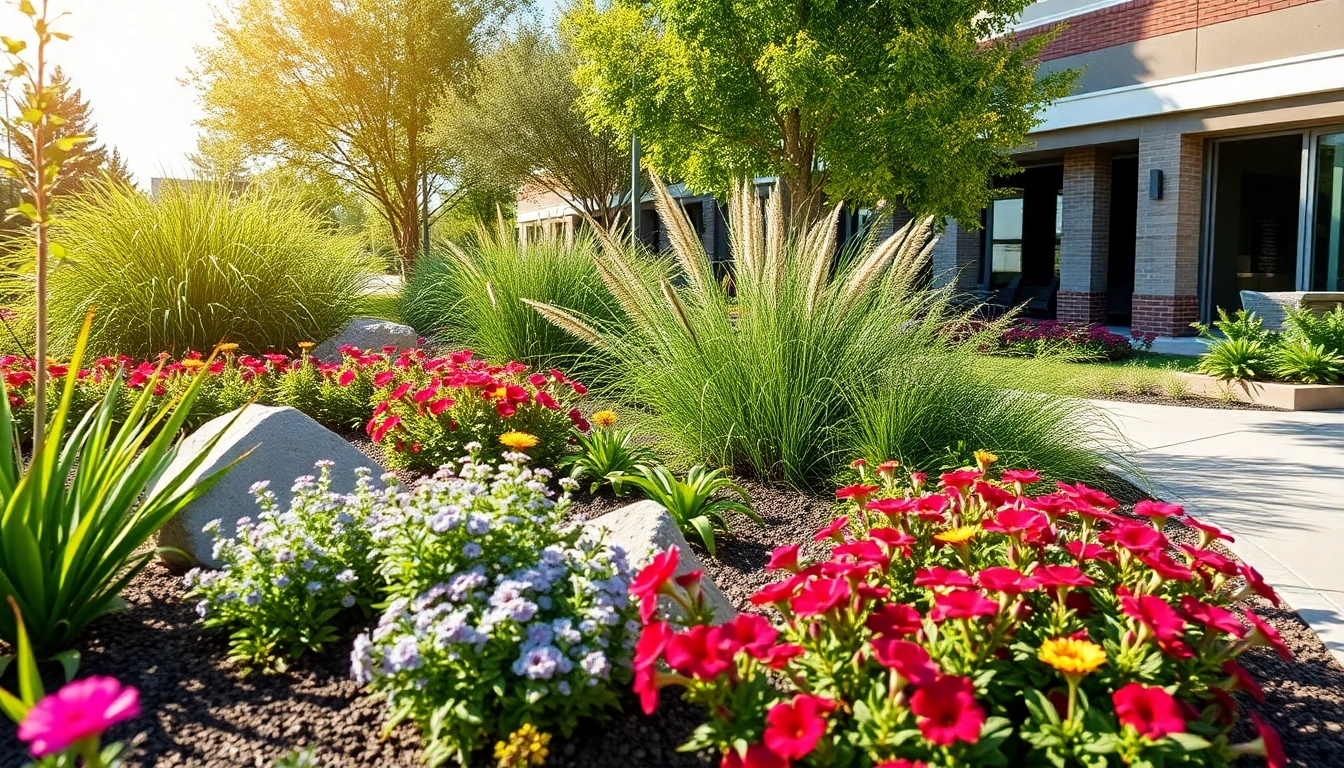Understanding Commercial Landscaping Contractors
In the world of business, first impressions are crucial, and the appearance of your commercial property plays a significant role in shaping those impressions. That’s where commercial landscaping contractors come into play. These professionals specialize in enhancing the outdoor environment of business premises, offering a myriad of services aimed at creating both functional and aesthetically pleasing landscapes. Whether you are looking to develop a new property, maintain an existing one, or revamp your outdoor spaces, understanding the role of commercial landscaping contractors is the first step toward achieving your vision.
What Do Commercial Landscaping Contractors Do?
Commercial landscaping contractors offer a wide range of services tailored to meet the unique needs of businesses and organizations. Their primary objective is to create environments that are not only visually appealing but also sustainable and functional. Here are some of the key roles and responsibilities of these professionals:
- Landscape Design: Contractors collaborate with clients to design landscapes that align with the client’s brand identity and business objectives. This may include the selection of plants, layout, and additional features like pathways or water features.
- Installation: Once a design is finalized, commercial landscaping contractors handle the installation of all landscape elements, including planting flowers, trees, shrubs, and laying sod.
- Maintenance: Contractors provide ongoing maintenance services, which may include mowing, trimming, fertilizing, pest management, and seasonal clean-up.
- Irrigation and Drainage: Effective water management is crucial for maintaining landscape integrity. Contractors design and install irrigation systems tailored to the specific needs of the plants and property.
- Environmental Sustainability: Many contractors are now focusing on eco-friendly practices, including using native plants, xeriscaping, and implementing sustainable waste management.
Benefits of Hiring Professionals in Landscaping
While some business owners might consider handling landscaping tasks in-house, hiring professional landscaping contractors comes with numerous advantages:
- Expertise and Experience: Professional contractors bring a wealth of knowledge and experience that ensure design and installation approaches lead to the best outcomes. They stay updated on the latest trends and techniques in landscaping.
- Efficiency: These contractors have access to the right tools and materials, allowing them to complete projects more quickly and efficiently than untrained personnel.
- Long-term Cost Savings: Investment in professional landscaping can lead to significant savings over time through enhanced energy efficiency, reduced maintenance costs, and improved property value.
- Customized Solutions: Professionals can provide tailored solutions that meet the specific needs of the business, taking into account factors like climate, soil conditions, and site layout.
- Increased Property Value: Properly landscaped commercial properties have been shown to retain higher property values, attract more customers, and create a positive impression.
Common Services Offered by Contractors
The range of services offered by commercial landscaping contractors can vary widely based on the contractor’s specialization. However, several core services are typically provided in this industry:
- Landscape Design and Consultation: Initial planning, design, and consultation services to create a customized landscape experience.
- Lawn Care: Services related to lawn installation, maintenance, and care, including aeration, overseeding, and fertilization.
- Snow Removal: Seasonal services such as snow plowing and removal to maintain accessibility and safety during winter months.
- Tree and Shrub Care: Plant installation, trimming, pruning, and disease management services for trees and shrubs.
- Landscape Lighting: Design and installation of outdoor lighting systems to enhance aesthetic appeal and offer utility at night.
- Paving and Hardscaping: Installation of non-plant features like patios, walkways, and retaining walls to create defined spaces within the landscape.
Choosing the Right Commercial Landscaping Contractor
Selecting the right commercial landscaping contractor is a critical decision that can significantly impact the success of your landscaping project. To ensure you find a contractor that meets your needs, consider the following factors:
Assessing Qualifications and Experience
When evaluating potential contractors, first and foremost, ensure they are qualified and have adequate experience in commercial landscaping. Here are some tips to assess qualifications:
- Check Credentials: Look for licenses, certifications, and insurance. A valid license indicates that the contractor adheres to the local laws and regulations governing landscaping services.
- Review Experience: Seek contractors with several years of experience, particularly in commercial projects. This experience not only demonstrates expertise but also provides peace of mind regarding the contractor’s reliability and professionalism.
- Ask for Referrals: Reach out to past clients to gain insights into their experiences. References can provide valuable information on the contractor’s quality, dependability, and customer service.
Questions to Ask Before Hiring
Having a clear understanding is crucial before committing to a contractor. Here are some important questions to ask:
- What services do you specialize in? Understanding their expertise will help you gauge if they fit your needs.
- Can you provide a detailed quotation? A detailed quote should clarify all aspects of the project, including labor, materials, and timeframes.
- What is your approach to sustainable landscaping? Given the emphasis on sustainability, it’s vital to understand their practices regarding eco-friendly landscaping.
- What warranties do you offer? Contracts should offer warranties on both materials and workmanship to safeguard your investment.
- How will you communicate throughout the project? Establishing clear communication protocols helps mitigate misunderstandings and keeps the project on track.
Evaluating Client Reviews and Portfolios
Reviews and previous work can give you an idea of a contractor’s capabilities. Consider the following avenues:
- Online Reviews: Review platforms like Yelp and Google provide client feedback that can help you gauge the contractor’s reputation.
- Portfolio: Ask to see a portfolio of their work. A well-curated portfolio showcases their style, creativity, and the quality of their projects.
- Social Media: Visit the contractor’s social media profiles for additional feedback and images of completed projects. Engagement and response levels can also indicate professionalism.
Cost Factors in Commercial Landscaping Projects
Understanding the costs associated with landscaping is essential for effective budgeting and planning. Landscaping projects can vary greatly in scope and expense, depending on several factors.
Breaking Down Landscaping Costs
Landscaping costs can be broken down into several components that together contribute to the overall project expense:
- Materials: This includes the cost of plants, soil, mulch, and hardscape materials such as stone and pavers.
- Labor: The cost of skilled labor for design, installation, and ongoing maintenance. The complexity of the project will dictate labor costs.
- Equipment: Expenses for required machinery like trucks, lawnmowers, or tools that may be needed for specific tasks.
- Design Fees: Fees charged by landscape designers who create detailed plans for the landscaping project.
- Permits: Depending on local regulations, you may need to acquire permits, the cost of which can add to the project’s overall budget.
How to Budget for Professional Landscaping
Budgeting for landscaping requires careful planning and consideration of potential costs. Here are some steps to help you create an effective budget:
- Define Your Goals: Establish what you want your landscaping to achieve, as this will guide your budget priorities.
- Research Average Costs: Educate yourself on average pricing for the specific services you require. This will provide a baseline for your budget.
- Get Multiple Quotes: Consult with several contractors for quotes to find a range of pricing and service options available.
- Allocate a Contingency Fund: Set aside a portion of your budget (typically 10-20%) for unexpected costs that may arise during the project.
- Prioritize Phases: Consider implementing your landscaping project in phases. This allows you to manage costs effectively without sacrificing overall quality.
Understanding Quotes and Estimates
Obtaining detailed quotes and estimates from your chosen contractor is vital for understanding what is included in the costs. Here’s what to look for in any quotation:
- Itemized Breakdown: An effective quote should detail each cost associated with the project, listed separately for transparency.
- Clear Timeline: Quotes should include estimated project timelines. This helps set expectations for project duration and milestones.
- Payment Terms: Understand the payment structure outlined in the quote. Be clear about any deposits, payment schedules, and final payments.
- Inclusions and Exclusions: Ensure all services are specified and note what might not be included, such as ongoing maintenance fees.
Best Practices for Effective Landscaping
Implementing best practices in landscaping can lead to successful long-term outcomes. Here are some recommended approaches:
Designing Landscapes with Functionality and Aesthetics
Striking a balance between beauty and utility is key to effective landscape design. Consider the following principles:
- Plan for Purpose: Identify specific functions for spaces, such as gathering areas, pathways, or green buffers, to inform design decisions.
- Choose Appropriate Plants: Select plant species that suit your location and climate, ensuring low maintenance and sustainability.
- Incorporate Hardscaping: Use hardscaping elements such as patios, walls, or paths to create structured spaces that complement the greenery.
- Utilize Natural Features: Work with existing topography and natural elements like slopes or water bodies to enhance landscape beauty and function.
Implementing Sustainable Landscaping Solutions
In today’s environmentally-conscious world, sustainable landscaping practices are more important than ever. Some effective strategies include:
- Native Plant Usage: Utilize native plants that demand less water and maintenance while supporting local ecosystems.
- Xeriscaping: Implement drought-resistant landscaping techniques to reduce water consumption during dry seasons.
- Soil Management: Use organic amendments and practices to improve soil health, leading to better plant growth and increased biodiversity.
- Efficient Irrigation: Invest in smart irrigation systems to ensure that water is used effectively, only applied when needed.
Seasonal Maintenance Tips for Longevity
Regular maintenance is essential for the long-term health and beauty of your landscaped areas. Here are key maintenance strategies:
- Regular Mowing and Trimming: Establish a mowing schedule that preserves lawn aesthetics and promotes healthy growth.
- Seasonal Clean-up: Conduct seasonal clean-ups to remove debris, dead plants, and weeds to maintain a tidy appearance.
- Pest and Disease Monitoring: Regularly inspect plants for signs of pests and diseases and take timely action to prevent infestations.
- Fertilization Schedules: Apply fertilizers according to the specific needs of plants and at appropriate times during the growing season.
Case Studies and Insights from Commercial Projects
Understanding practical applications of landscaping projects can offer valuable insights. Here are some noteworthy examples:
Before and After: Successful Landscape Transformations
Case studies illustrate the tangible benefits of professional landscaping. Here are a few examples:
- Commercial Plaza Revamp: A once-uninviting commercial plaza underwent a complete makeover with strategic planting, hardscaping features, and seating areas, resulting in a 30% increase in foot traffic.
- Corporate Campus Redesign: A corporate campus embellished with native flowers and trees integrated into walking paths facilitated staff interaction, improving employee wellbeing and productivity.
Client Success Stories with Landscaping Contractors
Real-world testimonials from satisfied clients often highlight the profound impact of professional landscaping:
- Retail Store Front: A local retailer reported increased sales by 15% after enhancing their storefront landscape with seasonal blooms and attractive signage.
- Hospital Grounds: A hospital transformed its outdoor space into a healing garden, benefiting both patients and visitors by promoting tranquility and providing a natural retreat.
Key Metrics for Measuring Landscaping Success
Measuring the success of your landscaping project involves tracking specific metrics:
- Client Satisfaction: Surveys and feedback from clients can gauge how well landscaping meets their needs.
- Foot Traffic Increases: Monitoring foot traffic before and after landscaping initiatives can highlight effectiveness in attracting visitors.
- Property Value Assessments: Annual assessments can provide insight into how landscaping affects property value over time.
- Maintenance Costs: Tracking ongoing maintenance expenses can help assess the long-term sustainability and cost-effectiveness of landscaping choices.



